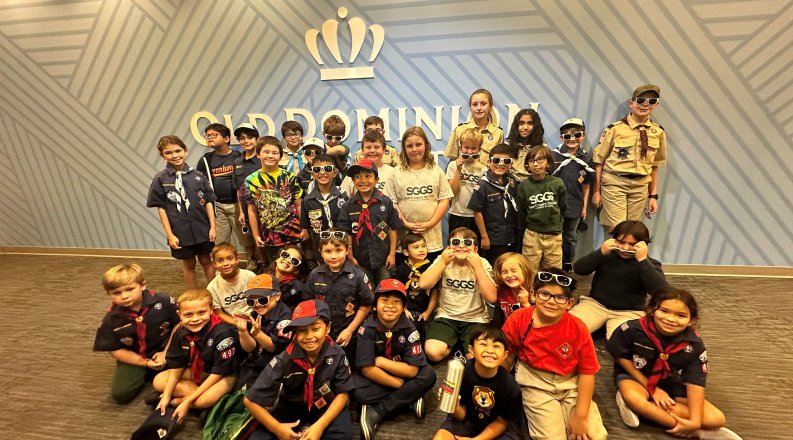By: Tiffany Whitfield, Julie Morgan and Eileen Hofmann
Local Cub Scouts from Pack 490 were the first to rekindle a tradition that has been 25 years in the making by the Center for Coastal Physical Oceanography (CCPO) at Old Dominion University.
More than 800 Boy Scouts from Virginia, Maryland and Ohio had earned oceanography merit badges through a marine science program led by CCPO over the years. The COVID-19 pandemic interrupted this decades-old partnership in 2020, but CCPO restarted its marine science education program this fall by hosting an event for 34 Cub Scouts, along with pack leaders, parents and siblings.
Julie Morgan, CCPO program manager, and Susan Craig, ocean & earth sciences office manager, worked to bring the educational science outreach program back to ODU.
The event also satisfied the Scouts’ Nova Award requirement. The science-based award program encourages Cub Scouts to explore science, technology, engineering and mathematics through research and hands-on activities. The pack included students in second through fifth grades.
The marine science educational and outreach program led by CCPO Professors Eileen Hofmann and John Klinck; CCPO Program Manager Julie Morgan; OES Department Manager Dana Schilling; and OES/CCPO graduate student Natalie Sprague created learning opportunities to engage the Cub Scouts in activities focused on the aquatic ecosystem and polar ice, two of the animal habitats included in the “Down and Dirty” module of the NOVA Award.
The program started with a short presentation that highlighted CCPO Antarctic scientific research. It included videos of icebergs caving from an ice shelf and sea life such as Adélie penguins, crabeater seals, krill and minke whales.
The Scouts then divided into groups to visit hands-on educational stations where they learned about the local Chesapeake Bay ecosystem and watershed. Hofmann and Klinck set up a touch tank for the pack that included oysters, periwinkle snails, mud crabs, clams and other invertebrates. The Scouts learned how important snails and oysters are to the Chesapeake Bay. Sprague and Morgan used a watershed table to demonstrate the effects of pollution on local waterways. Schilling asked Scouts questions about what they learned for a chance to spin a prize wheel and win OES-themed merchandise.
“Our Scouts love learning new things and get excited to see and experience hands-on science,” said pack leader Kendra DiMichele. “When they experience this at a young age, it stays with them, and we hope encourages them to learn and explore throughout their lives. Having educators at ODU that support youth programs is an amazing opportunity for our Scouts.”
Rodger Harvey, chair of OES at ODU, stressed the importance of this marine science program.
“It’s critical for our youth to understand the wonders of the ocean and have a chance to speak with working scientists who are also members of the community,” he said. “Our faculty, staff and students in CCPO have hosted many of these events over the years as part of science outreach. It’s as a wonderful way to connect us to the public, and I’m proud that OES is doing its part in this effort.”
If you or someone from your organization or school would like to take part in the ODU’s OES and CCPO marine educational outreach program, email julie@ccpo.odu.edu or scraig@odu.edu.
The CCPO marine science outreach program started in 1999 with a request to talk to a pre-school class about oceanography. This initial request set up what became a long-term informal science education program focused on engaging K-8 students in marine science. Over the years, the program evolved and expanded to accommodate many requests from individual classes, entire schools and special events, such as summer camps.



